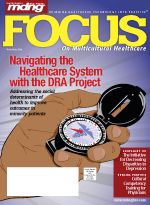Publication
Article
FOCUS Multicultural Healthcare
Translating Education into Clinical Practice: The Role of Learning Communities
Author(s):
In the March 2009 issue of MDNG: Focus on Multicultural Healthcare (FOMCH), I wrote about the importance of collaboration and the growing number of “learning communities” and grassroots efforts that are bringing people and organizations together to work on the issue of eliminating disparities in health and healthcare.
In this issue, we report on the successful NHLBI-funded National Consortium for Multicultural Education for Health Professionals (NCME), a group of 18 US medical schools that have been actively involved in developing a variety of valuable educational programs and curricular products for medical students, residents, and practicing physicians. The authors of our cover story provide an excellent overview of selected cultural competency curricular assessment tools, online CME programs, courses, texts, clinical cases, interviewing mnemonics, and unconscious bias-assessment tests available either from Consortium members or other organizations. They also share some of the important challenges and lessons learned and discuss future work needed in this field.
The NCME is a wonderful illustration of a “community of practice” (www.ewenger.com/ theory/index.htm) in medical education that is demonstrating how people are collaborating to make a real difference. Another example of a successful community of practice I have had the privilege of working with over the past 10 years is the Northeast Consortium on Cross-Cultural Medical Education and Practice and similar communities have formed elsewhere in the US and around the world.
Communities of practice are also developing in different medical specialties (eg, see www.aafp. org/fpm/20050100/28work.html), especially in relationship to the patient-centered medical home movement. Learning about cultural competency is integral to these efforts, has relevance for everyone involved in the delivery of healthcare, and should be seen as a life-long journey. Hopefully, social networking and other collaborative technologies will help to further connect and synergize our activities, enabling us to better translate education into clinical practice.
We are also pleased to highlight the important work and contributions of two national physician leaders who are engaged in groundbreaking health disparities research and the provision of high-quality care to vulnerable populations. Dr. Jean G. Ford at the Johns Hopkins Bloomberg School of Public Health shares findings from his community-oriented research into understanding and addressing cancer-related racial/ethnic and socioeconomic disparities, the determinants of racial disparities in participation in cancer therapeutic trials, and the efficacy of behavioral interventions to improve adherence to cancer screening and treatment. Dr. Jeffrey Mazique discusses his experiences working as a physician on a Navajo reservation and the unique challenges of providing care to that patient population.
Please share your thoughts and reactions to these and our previously published MDNG: Focus on Multicultural Healthcare articles that can be found online in the journal archives. We also welcome your suggestions for other topics, initiatives, and people you’d like to read about. Thanks very much for your continuing interest and support!
Robert C. Like, MD, MS
Professor and Director
Center for Healthy Families and Cultural Diversity
Department of Family Medicine
UMDNJ-Robert Wood Johnson Medical School New Brunswick, NJ





